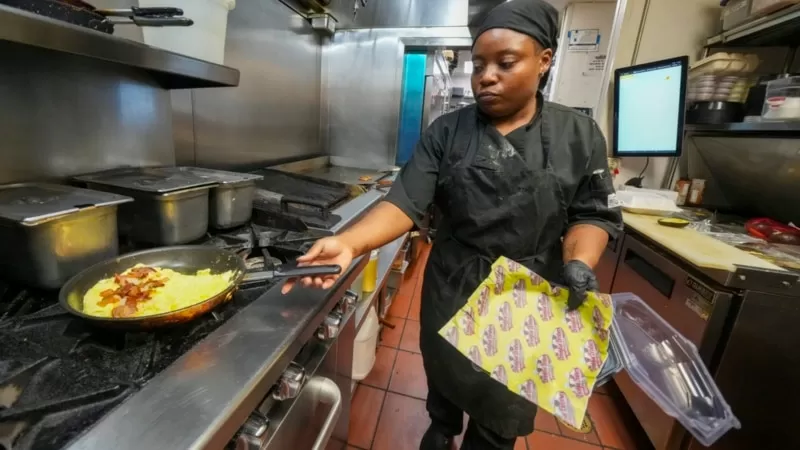The breakfast industry in the United States is booming, with more and more restaurants and fast-food chains adding breakfast items to their menus. However, this growth is being hindered by a major issue – record-high egg prices. It’s a classic chicken-and-egg problem, where the very dishes that are driving the demand for eggs are also contributing to the problem.
In recent years, the demand for breakfast items has skyrocketed, leading to a surge in the number of breakfast-focused restaurants. For example, First Watch, a popular chain that serves breakfast, brunch, and lunch, has nearly quadrupled its locations in the past decade. Similarly, Eggs Up Grill has expanded to 90 restaurants in nine southern states, up from just 26 in 2018. Another Broken Egg Café, based in Florida, celebrated its 100th restaurant last year.
Even fast-food chains are jumping on the breakfast bandwagon, with Starbucks offering 12 different items containing eggs on its breakfast menu and Wendy’s reintroducing breakfast in 2020 with 10 egg-based items. According to Yelp, a popular review website, there was a 23% increase in the number of breakfast and brunch businesses opening in the United States last year.
However, this surge in demand for eggs is coming at a time when the egg supply is facing a major challenge. An ongoing bird flu outbreak has forced farms to slaughter millions of chickens, turkeys, and other birds, leading to a scarcity of eggs and a subsequent increase in prices. In January, the average price of eggs in the U.S. hit a record high of $4.95 per dozen.
While it is not publicly available how many eggs are being supplied to restaurants compared to other places like grocery stores or food manufacturers, it is safe to assume that the demand from restaurants is growing. According to market research firm Circana, foot traffic at U.S. restaurants has seen the most growth during morning hours since 2019, with pre-lunchtime hours accounting for 21% of total restaurant visits in 2020.
The most popular breakfast item among customers is the breakfast sandwich, with 70% of breakfast sandwiches on U.S. menus containing eggs. Ricky Richardson, CEO of Eggs Up Grill, believes that the rise in breakfast restaurants is due to people seeking comfort and connection during the COVID-19 pandemic. As food prices continue to rise, breakfast and lunch are seen as more affordable options for eating out.
Interestingly, this growth in restaurant demand for eggs is a reversal of the trend seen during the pandemic. While consumers were stocking up on eggs for home use, restaurants were using fewer eggs due to closures and restrictions. However, with the easing of restrictions and the rise in demand for breakfast items, restaurants are now facing the brunt of the egg shortage.
The consumption of eggs in the U.S. has been on a decline for over five decades, but in recent years, it has seen a resurgence. This is due to nutritional research and marketing that has established eggs as an inexpensive source of protein, rather than a cholesterol bomb. As a result, per capita consumption of egg products has increased to the equivalent of 292 fresh eggs in 2019.
According to Brian Earnest, a lead economist for animal proteins at CoBank, consumers perceive eggs to be fresh, making them a popular choice for dishes. However, other factors have also contributed to the economics of eggs, such as the shift towards cage-free eggs due to animal rights concerns. This has made the market more complicated, with some states passing laws restricting egg sales to cage-free environments.
The rise in egg prices is hitting restaurants hard, with wholesale prices reaching a national average of $7.34 per dozen last week, a 51% increase from the beginning of the year. This has led some chains, like Waffle House, to add a surcharge to offset the cost of eggs. Others may turn to egg substitutes or cut egg dishes from their menus. Phil Kafarakis, the president and CEO of the International Foodservice Manufacturers Association, believes that this could lead to a shift in portion sizes for non-egg items, such as meat and potatoes.
Despite the challenges, some restaurants are determined to continue serving their customers with their signature egg dishes. Chris Tomasso, President and CEO of First Watch, states that eggs are a critical part of their brand and are found in the majority of their offerings. So far, they have been able to obtain the eggs they


